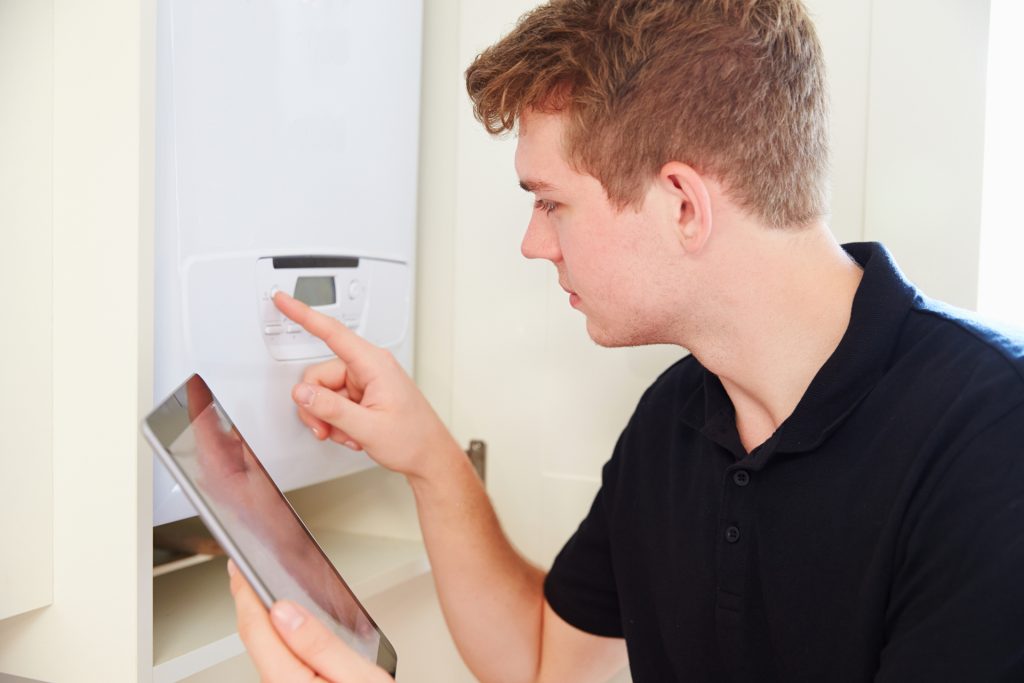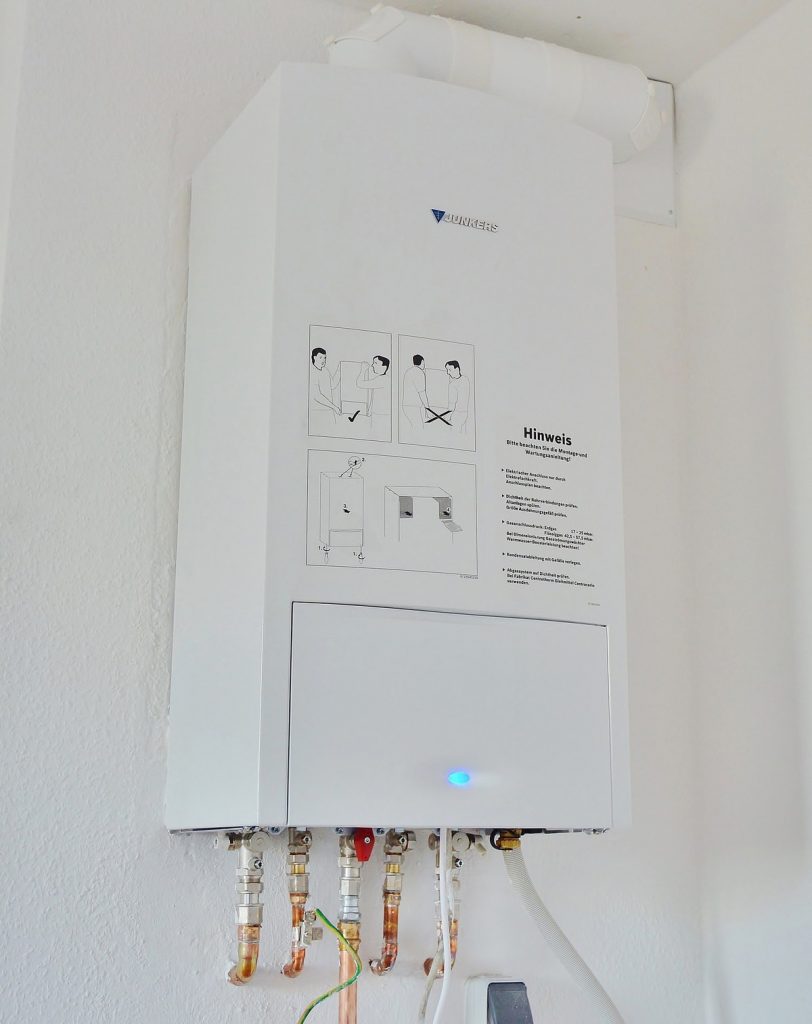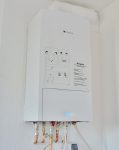Pros and cons of condensing boilers
A condensing boiler is a great water heating system that operates either by gas or oil. This boiler uses gas to warm the water, and this process releases carbon dioxide and water. The difference between a condensing boiler and the old system is that it uses big heat exchangers which move the gases to the heater.
The main reason you should use a condenser is to produce a high heat amount from gases, this heat would have otherwise gone to waste. It’s important to note that combi boilers are a type of condenser boiler too if you already have a combine boiler.
Modern boilers work better because they have condensing boilers. These boilers have a better heat exchanger, which keeps over 80% of heat from fuels. The high energy bills have led researchers to create a heat generator that will cut costs and save you money on heating bills. It would be great to look at if you want to replace yours.
You also need to choose your condensing boiler system carefully; it should bring enough heat to your house, and ideally, it should have great energy efficiency properties too. However, you should avoid oversized heaters because they might raise utility costs. You should consider the following things before buying a condenser;
- The number of visitors
- Occupants in the home
- If you use taps and shower at the same time
- How big is your house?
- Your capital.
Below, we discuss everything you need to know about condensing boilers.
Pros of a condensing boiler
Condensing boilers have several benefits over others, like conventional boilers, because they are modern. In countries like the UK, the government has required all their residents to use the condensing boiler and not any other type (this comes as part of their minimum C grade energy performance certificate requirements). This is the same case in the USA, and this shows how beneficial a boiling condenser is. The main pros of these boilers are;
1. They are efficient
These boilers have a 98% efficiency range, but this depends on the model. The latest condenser designs have a feature that prevents boilers from condensing when there is a heat exchange. Condensing boilers are 30% more efficient, and that is why they are better than non-condensing boilers. They use waste heat to heat water before it gets into the boiler, and this acquires more heat from outside.
According to Easy Boiler Company, which specialises in boiler installations, condensing boilers produce over 12% more heat than other boilers. They help lower energy bills and carbon footprints. These boilers are good alternatives to the standard heating system. Most non-condensing boilers, i.e., houses with old boilers or older boiler systems, are 79% efficient, but the old ones range at 50%. The higher the boiler efficiency, the more money you will save.
2. You will have a lower carbon footprint
From 2006, it has become a must that you have a condensing boiler. Suppose your old central heating system needs repair. These modern condensers lower toxic carbon emissions and most can save you over 1300 kilograms of carbon annually if you put one in your home. This feature makes you eligible for eco friendly grants which can help to clear installation bills.

3. Your home is safer
Modern condensing seals are covered well for heat insulation and they get air from the exterior place they are put at. There are no chances of the boiler sucking anything.
There is also no risk of contracting any toxic things because these liquids are emitted using a pipe in the drainage. It is easy to condense a boiler because they do not need a tank and you can store them in the cupboards.
4. They save space
You do not need to build a tank for your modern condensing boilers; you can create one in a sleek and compact manner. This is a benefit over traditional boilers because they can fit into any space with their small size and overcome any space issues.
5. They are friendly to the economy
A boiling condenser is more friendly to the environment because it retains waste to its system. These modern boilers have a smaller carbon footprint. You can save close to 1.8 tonnes of Carbon Dioxide. This gas would escape if it was a non-condensing boiler.

Disadvantages of condensing boilers
Most people assume that they should only replace their boilers when they become faulty. Below are some disadvantages of these boilers;
1. They are more complicated
These condensing boilers can shut down in extreme weather because their exterior pipe might freeze. These boilers might also become corroded by the acid concentration. However, these boilers are still worth it because of their high efficiency.
It would be great to keep your old boilers even after you update them as long as they still work. You should only shift to the condensers after the efficiency lowers, and this will be a great way to keep the old model in good shape.
2. They are expensive to maintain
Condensing boilers are more challenging to maintain because they are complex and require gas safe registered engineers, this will affect the boiler rates. It is easy to fix non-condensing boilers, meaning they will save you money for a short time. However, these modern boilers are more efficient for long-term purposes.
3. They are corrosive
Most heating in these boilers occurs in parts made from aluminium, which is a very corrosive agent. This metal corrodes in acidic places, meaning you should be careful when using the anti-freezing feature in this boiler. You can destroy your boiler by using excess antifreeze features. However, it is advisable to check the PH every year or two because these conditions change with time.
It is challenging to find the right condensing boiler, and this is because there are plenty in the market. Some people also find it hard to detect when the boiler is condensing or what type of boiler they’re looking at. Suppose you have a boiler in your home and you do not know whether it is condensing or not; you can check out the following things;
- The installation dates. Condensing boilers came after 2005, meaning yours works well if it was made anytime from that year.
- Drainage pipe and steam. You will know if you have a condensing boiler if you see any steam occurring from the flue and also if a white pipe leads to the drain.
- Observe the flue. Your boiler might be non-condensing if it has more gases or a metallic flue.
Condensing boilers are becoming more common in homes due to their multiple advantages. These boilers will make your heating system efficient and keep your family safe. Even though they are expensive, they will serve you for a long time, thus cutting repair costs and using less energy. Remember, always do your research when looking for the best condensing boiler.
![[AD] ✨ Festive magic for local families in the heart of Guildford ✨
We had the loveliest evening exploring the @guildfordilluminate light trail at Guildford Castle
The trail takes around 30–40 mins
with cosy stops for hot chocolate and toasting marshmallows, it’s a gorgeous Christmas activity for Surrey families.
It’s on until 4th January and makes the perfect festive plan:
🛍️ Christmas shopping in town
✨ The light trail
🍽️ Finish with dinner in Guildford
If you’re looking for a magical, stress-free festive outing with the kids — this is one to add to your Christmas list
📍 Guildford Castle, Castle St, Guildford GU1 3SX
#GuildfordWithKids #SurreyFamilies #ChristmasInSurrey](https://suburban-mum.com/wp-content/uploads/2018/09/589257185_18566118850016840_4432952740767953046_n-180x320.jpg)
![[AD] We went to the newly opened Cha Sha Kingston a couple of weeks ago, and wow — taste bud adventure unlocked! The boys devoured the masala fries and chicken tikka rolls, while we couldn’t get enough of that epic kebab butter curry 😍🍛.
It’s amazing value for food this tasty (and everyone left happy and VERY full!).
Delicious food, vibrant vibes and incredible value — the perfect combo for your next meal.
📍Cha Sha Kingston
43 Surbiton Road, KT1 2HG
🌐 chasha.co.uk
Other Cha Sha locations in Birmingham, Ilford, Southampton and Wembkey
#ChaSha #ChaShaKingston #KingstonEats #FoodieFinds #UKFoodie #FoodReview #KingstonUponThames #FamilyEats #FamilyDining #FoodieKids](https://suburban-mum.com/wp-content/uploads/2016/02/574770541_18560351146016840_6855048070839528040_n-180x320.jpg)

![[AD] We’re a cricket-mad family, so we’re buzzing that @thehundred is back this August! 🏏🔥
To get ready, M tried out the official FREE Activity Pack — and it’s brilliant! 🙌
Packed with fun games, creative challenges and sporty tasks, it’s perfect for getting kids hyped whether you’re at home or on the go.
👉Download yours now (link in bio)
@londonspirit @ovalinvincibles #EveryMomentCounts #TheHundred
#EnglandCricket #CricketFamily #TheHundredCricket #LondonBloggers #Cricket #CricketIsLife #kidsfun](https://suburban-mum.com/wp-content/uploads/2022/11/505472555_18531279601016840_7092520074819907569_n-180x320.jpg)



![[AD - Press visit]
We enjoyed the glorious sunshine this weekend with a trip to Brighton. We went on the @brightoni360official which is right by the sea front.
The i360 pod take a slow journey up, allowing you to take in views across Brighton and the South Downs 450ft above ground. There’s a bar inside with drinks and snacks available to purchase and the experience lasts 25 minutes.
Afterwards, we headed to the open air roller rink for a roller skating session!
The roller rink is:
⭐ Suitable for over 5s
⭐ £6.50 if you have your own skates or £9.50 if you need to hire them
⭐ 45 minutes per session
Full details to visit the i360 + skating
📍 Brighton i360, Lower Kings Road, Brighton BN1 2LN
🚗 Parking nearby (we parked in the Regency Square Car park)
🎟️ Prices start from £25.40 for an adult and £16.90 for a child
🕐 Opening hours are currently Sun-Fri 10.30am-18.30pm and until 19.30pm on Saturdays
☕️ Bar inside the i360, cafe and gift shop
Book tickets here:
https://tickets.brightoni360.co.uk/tickets/?_ga=2.195305772.1869001490.1689671753-1757164059.1689671753/#events?eventid=157](https://suburban-mum.com/wp-content/uploads/2015/04/417980235_313576471048632_3682382982231216432_n.jpg)

![[AD] ***Summer of fun at Barracudas Activity Camps!****
There is plenty for kids to do at @barracudas_activity_day_camps
From Tennis, Archery, Swimming, Motor Sports and more you can be sure that there will be something for kids aged 4.5-14. ⚽🏈🥅🎾🏓🏎️🏹🏊♂️🏉
You can book on a day by day basis - so it can fit in with any other days out/activities you have planned and there are early drop off and late pickup options available. Barracudas are also Ofsted registered so you can use your Childcare Vouchers too.
⭐⭐⭐Get £20 off a week or £4 off a day using my discount code: MARIA20⭐⭐⭐
#BarracudasActivityDayCamp #BarracudasActivityCamp #BarracudaAmbassadors #SummerHolidays #SchoolHolidays #Summer2023 #SummerCamp #DayCare #Camp #KidsCamp #surreymummy #surreymums #SummerOfFun #ActivityCamps #HolidayCamps #Childcare #SchoolHolidays #schoolholidaycamps](https://suburban-mum.com/wp-content/uploads/2024/07/353583570_625625966167953_545896259645102575_n.jpg)



![[AD] We have some super exciting news...we have been chosen to be Laser Quest Ambassadors, and the boys are over the moon!
We are really lucky that our local Laser Quest (@laserquestkingston) is just around the corner from us. It means we can pop in of a weekend or anytime during the school holidays, and with summer just around the corner, I know Laser Quest will be one of our go-to places for some family fun.
As well as games of Laser Quest, there are also VR experiences and arcade amusements too. To find out a bit more about how Laser Quest works, you can read my blog post: https://www.suburban-mum.com/laser-quest-kingston/ (clickable link in bio)
Don't forget to keep an eye out for our Laser Quest posts - I'm going to be giving away two family passes to use at Laserquest Kingston!
If you can't wait and want to head down to Laser Quest to try it out, use the code SUMMER30 for 30% off your booking. The code is valid from now until the end of August 2023 and can be used on Laser Quest games and birthday party bookings.
#LaserquestAmbassador #Laserquest #LaserquestKingston #ActivitiesForKids #FamilyFun #DaysOutWithKids #Lasertag #LaserquestVR #Kingston #ThingsToDoInKingston #SurreyFamilyDaysOut #ThingsToDoWithKids #RainyDayFun #SurreyMummy #SurreyLife #LifeWithKids #LifeWithBoys #familyfunday](https://suburban-mum.com/wp-content/uploads/2015/04/353230107_797358078406942_2405522556733455165_n.jpg)

![[AD] The sun has finally made an appearance and the boys have been making the most of it by spending it
in the garden.
They’re go-to is always football and they’ve been trying to improve their aim and accuracy with the new Messi Foldable Footlball goal from the #MessiTrainingSystem range.
I love the fact the goal is foldable, making it easy to store away when not in use. It is also lightweight so you can effortlessly pack it up and take it to the park or to a friend’s house.
The Messi Foldable Football Goal retails at £36 and can be purchased from @argos
You can read my full review here: https://www.suburban-mum.com/messi-foldable-football-goal/
#TrainLikeMessi #FoldableFootballGoal #FootballSkills #OutdoorFun #LionelMessi #LeoMessi #FootballAtHome #OutdoorKids #JustGetOutside #OutdoorsAndFree #ScreenFreeKids #WhateverTheWeatherKids @flair_gp](https://suburban-mum.com/wp-content/uploads/2015/04/341194882_615024710178056_41977149395989448_n.jpg)

![[AD] We are absolutely thrilled to announce that we are Barracuda Ambassadors again this year.
With Easter just around the corner, the boys were sent the @barracudas_activity_day_camps new camp kit in preparation for the school holidays.
There’s a wide range of activities for kids aged 4.5 - 14 including Tennis, Archery, Basketball, Arts & Crafts and more.
If you like the sound of Barracudas, find out more over on their website. You can also save £20 a week or £4 a day, using my discount code: MARIA20](https://suburban-mum.com/wp-content/uploads/2024/07/336812306_765234558514317_685553691647241974_n.jpg)





